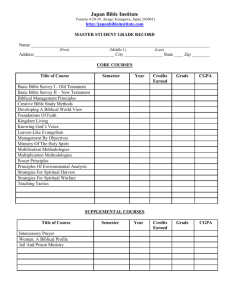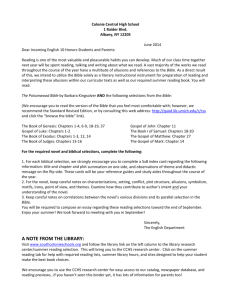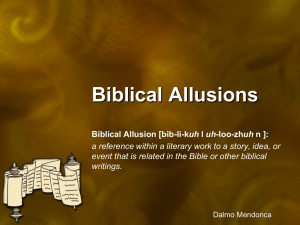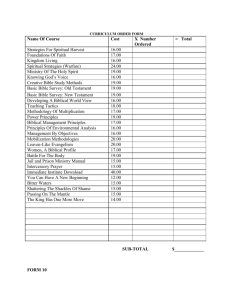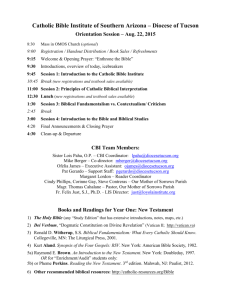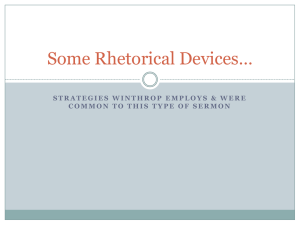Review 4: The Bible and Literature
advertisement
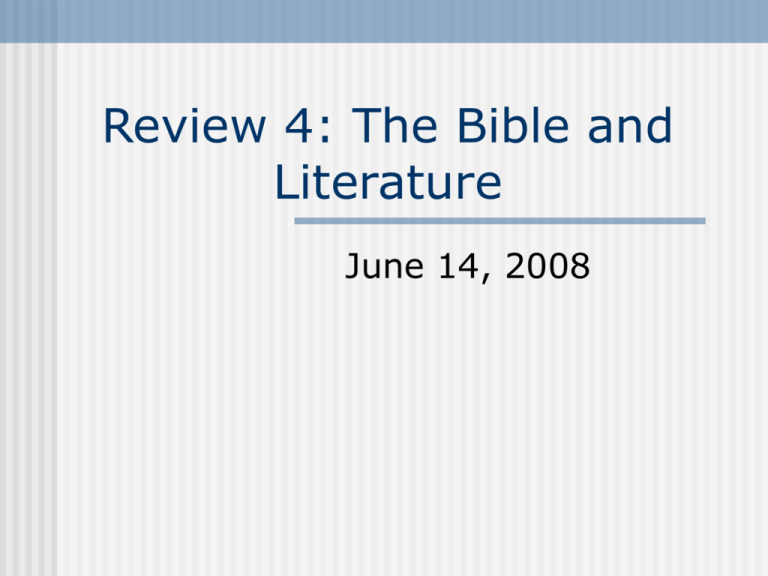
Review 4: The Bible and Literature June 14, 2008 Dante and the Bible Dante Alighieri: Books and Biography The Divine Comedy: Study Guide the word "comedy," in the classical sense, refers to works which reflect belief in an ordered universe, in which events not only tended towards a happy or "amusing" ending, but an ending influenced by a Providential will that orders all things to an ultimate good. By this meaning of the word, the progression of Dante's pilgrimage from Hell to Paradise is the paradigmatic expression of comedy, since the work begins with the pilgrim's moral confusion and ends with Shakespeare and the Bible Life and Works: Hamlet Hamlet: 1. The Theme of siblings murder 2. Be true to thyself: Polonius:Act I, Scene 3 (Lines 545-565) Ecclesiasticus:37:13 3. To be or not to be: Job Henry VI The idea of marriage: Henry VI, part 3 - Act 1, Scene 1 by William Shakespeare King Henry VI’s son Charles says: 不, 神不許我希望他們悲慘. 他們乃是神所 配的. 悲慘啊! 一但剪斷他們共負的軛樑. This same concept is revealed in: Matthew 19:6:BibleGateway.com Measure for Measure Matthew 7:2: Jesus Teaches On The Mountain About Saying What Is Wrong In Others 1 "Do not say what is wrong in other people's lives. Then other people will not say what is wrong in your life. 2 You will be guilty of the same things you find in others. When you say what is wrong in others, your words will be used to say what is wrong in you. 3 Why do you look at the small piece of wood in your brother's eye, and do not see the big piece of wood in your own eye? 4 How can you say to your brother, 'Let me take that small piece of wood out of your eye,' when there is a big piece of wood in your own eye? 5 You who pretend to be someone you are not, first take the big piece of wood out of your own eye. Then you can see better to take the small piece of wood out of your brother's eye. John Milton and the Bible Life and Works: John Milton (16081674) Paradise Lost Of Man’s first disobedience, and the fruit Of that forbidden tree whose mortal taste Brought death into the world, and all our woe. Paradise Lost. Book i. Line 1. Paradise Lost: Milton: Paradise Lost Book 1 John Bunyan and the Bible Life: John Bunyan Biography Works:John Bunyan Page The Pilgrim’s Progress: Christian Classics Ethereal Library John Donne and the Bible Life: Works: The Works of John Donne Death Be not proud: John Donne. Holy Sonnet 10. (In this poem, Death is personalized. Here John Donne illustrated the Christian world view, stating that death is not an end to Christians.) For whom the bell tolls: Meditation XVII – Wikisource (written after Donne recovered from a severe illness) Charles Dickens and the Bible Life: Charles Dickens Works: A Christmas Carol Theme: the rich who is stingy to help the poor will be judged. Luke 16:BibleGateway.com Charles Dickens A Tale of Two Cities Theme: sacrification for friends John 15:3: Greater love has no one than this, that he lay down his life for his friends. C. s. Lewis Life: C. S. Lewis Quotes: C. S. Lewis Quotes Works: The Problem of Pain A Grief Observed C. S. Lewis Space Trilogy Out of the Silent Planet (1938) Pearland (aka Voyage to Venus) (1943) That Hideous Strength (1946) The Screwtape Letters (1942) C. S.Lewis The Chronicles of Narnia The Lion, the Witch and the Wardrobe (1950) Prince Caspian (1951) The Voyage of the Dawn Treader (1952) The Silver Chair (1953) The Horse and His Boy (1954) The Magician's Nephew (1955) The Last Battle (1956) Flannery O’Connor Grace changes us and change is painful. –by Flannery O’Connor Life: Flannery O'Connor (1925-1964) Workds: A Good Man is Hard to Find Critics on O’Connor: Critics: Others Nathaniel Hawthorne: The Scarlet Letter; The Celestial railroad G. K. Chesterton: Father Brown T. S. Eliot: the Waste Land; Murder in the Cathedral; Ash Wednesday; Journey of the Magi Dorothy Sayers: the Man Born to Be King Others R. R. R. Tolkien: the Hobbit; The Lord and the Ring Samuel Becket; William Blake, Byron; Chaucer; Connard; stephan Crane, Emily Dickson, Fauckner; Robert Frost; Hemmingways; Ellen Poe; Stainbeck; Tennyson, Whiteman Biblical Allusions Eleven hour: the last possible time for doing something; not too late to do something (Matthew 20) A (good) Samaritan: one who gives help to people in trouble or distree (Luke 10:30-37) Doubting Thomas: one who doesn’t trust anything easily (John 20:24-29) Biblical Allusions Prodigal son: a repentant son or a criminal with deep sense of guilt for wrongdoing (Luke 15:11-32) The salt of the earth: onoe who is honest and dependable; one whose character is valuable and admirable (Matthes 5:13) Biblical Allusions A wolf in sheep’s clothing: a hypocrite; one who appears to be a friend but rather an enemy; one who pretends to be harmless but rather dangerous (Matthew 7:15) A thorn in one’s flesh/sides: a constant irritation; a petty annoyance; a pain in the neck (Corinthian II 12:7) Biblical Allusions The spirit is willing, but the flesh is weak: one has good intentions, but one’s weakness fails to fulfill them (Matthew 26:41) Biblical Allusions The grapes of wrath: used as the title of one of John Steinbeck’s novels Revelation 14:19-20, an apocalyptic appeal to divine justice and deliverance from oppression in the final judgment. And the angel thrust in his sickle into the earth, and gathered the vine of the earth, and cast it into the great winepress of the wrath of God. And the winepress was trodden without the city, and blood came out of the winepress, even unto the horse bridles, by the space of a thousand and
